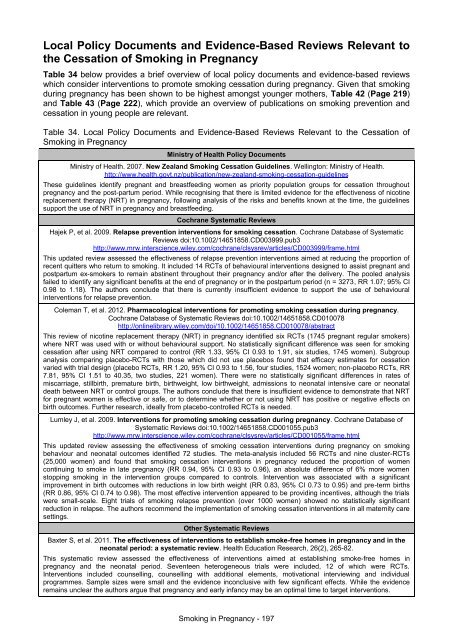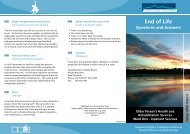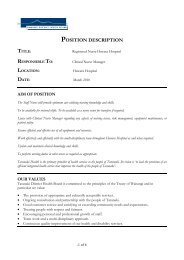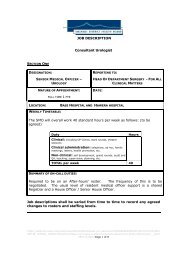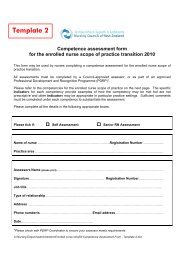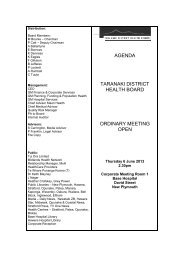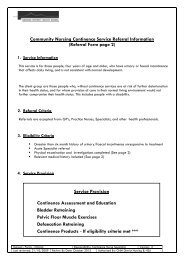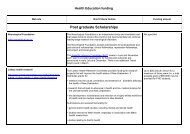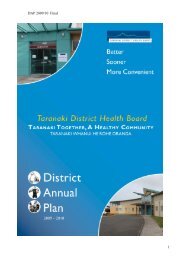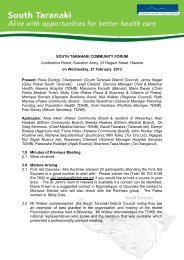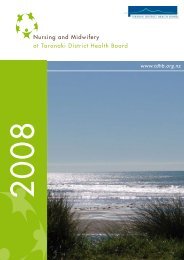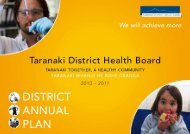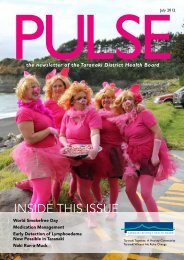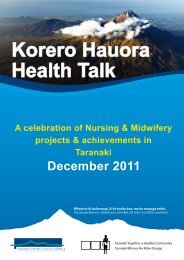This annual report - Taranaki District Health Board
This annual report - Taranaki District Health Board
This annual report - Taranaki District Health Board
- No tags were found...
Create successful ePaper yourself
Turn your PDF publications into a flip-book with our unique Google optimized e-Paper software.
Local Policy Documents and Evidence-Based Reviews Relevant tothe Cessation of Smoking in PregnancyTable 34 below provides a brief overview of local policy documents and evidence-based reviewswhich consider interventions to promote smoking cessation during pregnancy. Given that smokingduring pregnancy has been shown to be highest amongst younger mothers, Table 42 (Page 219)and Table 43 (Page 222), which provide an overview of publications on smoking prevention andcessation in young people are relevant.Table 34. Local Policy Documents and Evidence-Based Reviews Relevant to the Cessation ofSmoking in PregnancyMinistry of <strong>Health</strong> Policy DocumentsMinistry of <strong>Health</strong>. 2007. New Zealand Smoking Cessation Guidelines. Wellington: Ministry of <strong>Health</strong>.http://www.health.govt.nz/publication/new-zealand-smoking-cessation-guidelinesThese guidelines identify pregnant and breastfeeding women as priority population groups for cessation throughoutpregnancy and the post-partum period. While recognising that there is limited evidence for the effectiveness of nicotinereplacement therapy (NRT) in pregnancy, following analysis of the risks and benefits known at the time, the guidelinessupport the use of NRT in pregnancy and breastfeeding.Cochrane Systematic ReviewsHajek P, et al. 2009. Relapse prevention interventions for smoking cessation. Cochrane Database of SystematicReviews doi:10.1002/14651858.CD003999.pub3http://www.mrw.interscience.wiley.com/cochrane/clsysrev/articles/CD003999/frame.html<strong>This</strong> updated review assessed the effectiveness of relapse prevention interventions aimed at reducing the proportion ofrecent quitters who return to smoking. It included 14 RCTs of behavioural interventions designed to assist pregnant andpostpartum ex-smokers to remain abstinent throughout their pregnancy and/or after the delivery. The pooled analysisfailed to identify any significant benefits at the end of pregnancy or in the postpartum period (n = 3273, RR 1.07; 95% CI0.98 to 1.18). The authors conclude that there is currently insufficient evidence to support the use of behaviouralinterventions for relapse prevention.Coleman T, et al. 2012. Pharmacological interventions for promoting smoking cessation during pregnancy.Cochrane Database of Systematic Reviews doi:10.1002/14651858.CD010078http://onlinelibrary.wiley.com/doi/10.1002/14651858.CD010078/abstract<strong>This</strong> review of nicotine replacement therapy (NRT) in pregnancy identified six RCTs (1745 pregnant regular smokers)where NRT was used with or without behavioural support. No statistically significant difference was seen for smokingcessation after using NRT compared to control (RR 1.33, 95% CI 0.93 to 1.91, six studies, 1745 women). Subgroupanalysis comparing placebo-RCTs with those which did not use placebos found that efficacy estimates for cessationvaried with trial design (placebo RCTs, RR 1.20, 95% CI 0.93 to 1.56, four studies, 1524 women; non-placebo RCTs, RR7.81, 95% CI 1.51 to 40.35, two studies, 221 women). There were no statistically significant differences in rates ofmiscarriage, stillbirth, premature birth, birthweight, low birthweight, admissions to neonatal intensive care or neonataldeath between NRT or control groups. The authors conclude that there is insufficient evidence to demonstrate that NRTfor pregnant women is effective or safe, or to determine whether or not using NRT has positive or negative effects onbirth outcomes. Further research, ideally from placebo-controlled RCTs is needed.Lumley J, et al. 2009. Interventions for promoting smoking cessation during pregnancy. Cochrane Database ofSystematic Reviews doi:10.1002/14651858.CD001055.pub3http://www.mrw.interscience.wiley.com/cochrane/clsysrev/articles/CD001055/frame.html<strong>This</strong> updated review assessing the effectiveness of smoking cessation interventions during pregnancy on smokingbehaviour and neonatal outcomes identified 72 studies. The meta-analysis included 56 RCTs and nine cluster-RCTs(25,000 women) and found that smoking cessation interventions in pregnancy reduced the proportion of womencontinuing to smoke in late pregnancy (RR 0.94, 95% CI 0.93 to 0.96), an absolute difference of 6% more womenstopping smoking in the intervention groups compared to controls. Intervention was associated with a significantimprovement in birth outcomes with reductions in low birth weight (RR 0.83, 95% CI 0.73 to 0.95) and pre-term births(RR 0.86, 95% CI 0.74 to 0.98). The most effective intervention appeared to be providing incentives, although the trialswere small-scale. Eight trials of smoking relapse prevention (over 1000 women) showed no statistically significantreduction in relapse. The authors recommend the implementation of smoking cessation interventions in all maternity caresettings.Other Systematic ReviewsBaxter S, et al. 2011. The effectiveness of interventions to establish smoke-free homes in pregnancy and in theneonatal period: a systematic review. <strong>Health</strong> Education Research, 26(2), 265-82.<strong>This</strong> systematic review assessed the effectiveness of interventions aimed at establishing smoke-free homes inpregnancy and the neonatal period. Seventeen heterogeneous trials were included, 12 of which were RCTs.Interventions included counselling, counselling with additional elements, motivational interviewing and individualprogrammes. Sample sizes were small and the evidence inconclusive with few significant effects. While the evidenceremains unclear the authors argue that pregnancy and early infancy may be an optimal time to target interventions.Smoking in Pregnancy - 197


